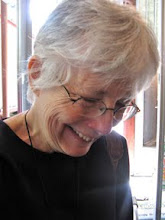My sisters and I watched a DVD this afternoon featuring several scholars who are offering a program on religion and violence at Trinity Institute. Three of our sisters are actually attending that conference. One of the interviews was with James Carroll, who wrote the bestseller: Constantine's Sword. I haven't read it yet, but it's on my list. One of the things he mentioned was "boundary setting" by the monotheistic religions... using the analogy that original sin is our tendency to differentiate ourselves at the expense of someone else. I am good/you are bad. I will go to heaven/you will be damned. He believes that these are boundaries which are finally (if slowly) breaking down. I hope he's right.
He talked about the language of our sacred texts... not that we need to change it, but that we need to read it in the light of historical context, not only the writer's context, but the context of subsequent generations of readers who shaped and reshaped the meanings that influence us today. Our challenge is to stay open to interpretations that will be relevant now.
 I think a lot about the whole "God made humankind in his image" concept. In what way? Physicality? Intellect? Soul?
I think a lot about the whole "God made humankind in his image" concept. In what way? Physicality? Intellect? Soul?What we have done, is make God in our image instead... and there's been a horrendous degradation as a result... sort of like cloning from a clone. With each step from the original, you lose important pieces of the DNA. Because of our technology, we have learned how to successfully clone some things, and more are coming. It seems we ought to be able to reinterpret the language of our scripture in light of that new understanding. Most of the time we just use the old understanding to condemn the new technology.




No comments:
Post a Comment